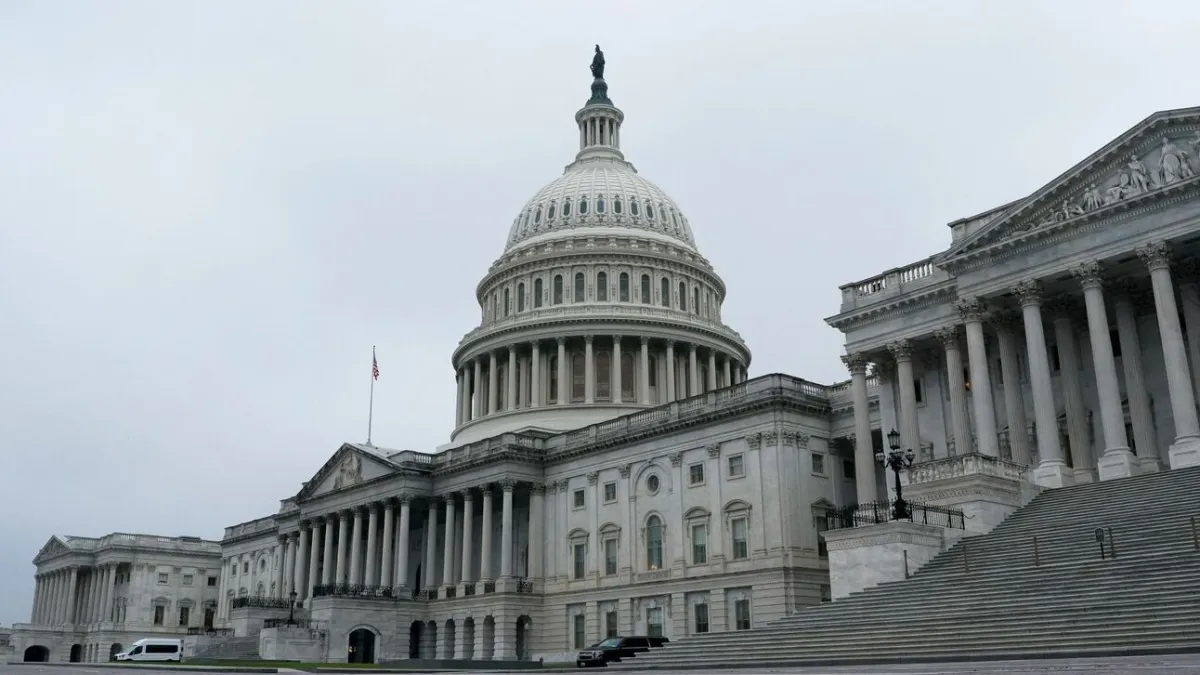
Thursday’s not-so-sweet Day 16 of the government shutdown saw senators head home for the weekend after a stopgap Republican funding bill again fell short of the 60 votes needed to advance. It was the tenth time the bill has been blocked. So what’s new? Senators today also failed to move ahead with a bipartisan annual defense funding bill.
In a 50-44 vote, Senate Democrats blocked the fiscal 2026 defense appropriations bill, which had passed out of committee at the end of July with strong bipartisan support. Three Democrats voted with Republicans on Thursday: Sens. Catherine Cortez Masto of Nevada, John Fetterman of Pennsylvania and Jeanne Shaheen of New Hampshire.
Senate Majority Leader John Thune had brought up the defense bill, which includes a 3.8% military pay raise, in a bid to pressure Democrats, effectively daring them to vote against it. “They’re going to have a chance to vote to advance full-year Defense appropriations legislation, so that if we can’t reopen the entire government, we can at least make some progress toward securing paychecks for our troops and for defending our country,” he said on the Senate floor before the vote.
But Democrats said that talks to end the shutdown should take priority over individual appropriations measures. Senate Minority Leader Chuck Schumer also called for the vote on the defense bill to be paired with action on the Labor, Health and Human Services funding bill. “It’s always been unacceptable to Democrats to do the defense bill without other bills that have so many things that are important to the American people in terms of health care, in terms of housing, in terms of safety,” Schumer told reporters.
Other Democrats said that trust and communication between the two sides had broken down this year and that Thune hadn’t made clear his intentions.
“We have had a positive and productive process in Senate Appropriations this year, but the leader’s motion to go to the House defense bill was not expected, was not discussed, was not clear to my caucus as to what happens next,” Delaware Sen. Chris Coons, the top Democrat on the Senate Appropriations Defense subcommittee, said in remarks on the Senate floor.
Coons added: “The way we move these bills forward is by linking arms and making it clear: We reject rescissions, we want to appropriate beyond just defense, we want a broader package, and to have clarity from our president, the House and the Senate about how we address the imminent health security crisis that confronts millions of Americans and, for today and tomorrow, keeps our government shut down.”
Thune railed against Democrats after the vote. “The Democrat Party is the party that will not take yes for an answer,” he said.
Both sides getting blamed: A new poll from the Associated Press-NORC Center for Public Affairs Research finds that both sides are getting blamed. Nearly 60% of Americans say Trump and Republicans in Congress bear “a great deal” or “quite a bit” of responsibility for the shutdown, while 54% say the same about Democrats in Congress. More than 75% say each deserves at least a moderate amount of blame for the impasse.
Most of those surveyed, 54%, say the shutdown is a major problem, though that number is only 37% among Republicans, compared with 69% for Democrats.
The AP-NORC poll of 1,289 adults was conducted from October 9 to 13 and has an overall margin of sampling error of plus or minus 3.8 percentage points.
What’s next: The shutdown will continue into next week, with no sign of progress toward a deal to end it.
The two sides remain dug in — and each sees signs it’s winning. The White House is reportedly confident and telling congressional Republicans to keep up the fight, citing sliding poll numbers for Democrats. “Democrats are taking on water,” a senior administration official told Axios. “And we have a higher pain tolerance.”
Axios’s Marc Caputo reports that internal White House polling shows that 44% of voters blame the shutdown on Trump and congressional Republicans compared to 38% who blame Democrats. “But public opinion has shifted a net of seven percentage points against Democrats,” Caputo writes. “Two weeks ago, Democrats had a 13-point advantage on who was to blame. Now that lead has been cut by more than half.”
Congressional Democrats’ net favorability rating has also slipped in the polling, Caputo notes. But Democrats say that polls show the public understands and agrees with their demand that enhanced Affordable Care Act subsidies should be extended, and they insist Republicans will feel increasing pressure to negotiate as notices of soaring insurance premiums start to arrive.
That all adds up to the potential for a lengthy shutdown. “I think this will be the longest shutdown in the history of ever. And I don't say that happily. I don’t say that proudly. I'm just saying that realistically,” Republican Sen. John Kennedy of Louisiana told CNN on Wednesday. Asked if he sees the shutdown stretching past Thanksgiving, Kennedy said he does: “I just don't see what's going to get us out of it.”
